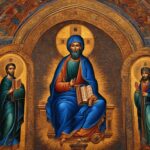St. Athanasius, a prominent figure in Church history, was a steadfast defender of Christian orthodoxy during a crucial era of Early Christianity. Known as Athanasius of Alexandria, he played a significant role in the development of Orthodox theology and the formulation of the Nicene Creed. Born in Alexandria, Egypt in 298 A.D., Athanasius was raised in the Christian faith and faced persecution during the Roman Empire’s crackdown on Christians. Despite these challenges, he dedicated his life to upholding the true Christian doctrine and combating the heresy of Arianism.
Athanasius attended the First Ecumenical Council and played a pivotal role in affirming the belief in the consubstantiality of Christ with the Father. Throughout his life, he wrote extensively to combat Arianism and defend the orthodox teachings of the Church. His influential works include the renowned “On the Incarnation.” St. Athanasius’ unwavering commitment to the faith and tireless efforts to promote orthodoxy have made him one of the most revered Church fathers in history.
Key Takeaways:
- St. Athanasius was a staunch defender of Christian orthodoxy during the early years of the Church.
- He played a crucial role in the formulation of the Nicene Creed and the fight against Arianism.
- Athanasius’ influential writings, including “On the Incarnation,” clarified and defended the true doctrines of the Church.
- Despite facing challenges and persecutions, St. Athanasius remained steadfast in his commitment to the faith.
- His life and teachings continue to inspire and shape the course of Christian history.
Early Life and Background of St. Athanasius
St. Athanasius, a prominent figure in Christian history, was born in Alexandria, Egypt in 298 A.D. to devout Christian parents. His early life was marked by the challenges and dangers faced by Christians under the rule of the Roman Empire, particularly during the period known as the Great Persecution.
Despite the tumultuous times, Athanasius remained unwavering in his Christian faith. Raised with a deep devotion to God, he was nurtured in the teachings of the Church and grew to understand the importance of defending the true Christian faith.
In the midst of persecution, St. Athanasius witnessed firsthand the resilience and steadfastness of believers in Alexandria, which further strengthened his own faith. His early experiences shaped his character and laid the foundation for his future role as a defender of orthodoxy.
From his formative years in Alexandria, St. Athanasius demonstrated a deep commitment to the Christian faith, which would shape the trajectory of his life and leave an indelible mark on the history of Christianity.
Call to Religious Life
After the persecution ended and Christianity was no longer outlawed, St. Athanasius felt a strong call to dedicate his life to serving God in the religious life. He joined the Holy Ascension Monastery at Dubovsk and later became a hieromonk. His skills as a preacher and his unwavering commitment to the Orthodox Church caught the attention of Pope Alexander, the Patriarch of Alexandria, who became his mentor and appointed him as his personal archdeacon. This marked the beginning of St. Athanasius’ journey as a leader in the Orthodox Church.
Work of St. Athanasius
St. Athanasius dedicated the majority of his adult life to defending the true Christian faith against the heresy of Arianism. Through his extensive writings, he clarified and defended the orthodox teachings on the nature of Christ, tirelessly working to articulate and protect the doctrines of the Church.
Athanasius produced several influential works that have had a lasting impact on Christian theology. His most well-known work, “On the Incarnation,” delves into the profound mystery of Christ’s incarnation and highlights its significance for the salvation of humanity. In this seminal work, Athanasius eloquently defends the full divinity and consubstantiality of Christ with the Father, effectively refuting the Arian heresy.
Another significant contribution by St. Athanasius is his “History of the Arians.” In this work, he meticulously recounts the origins and development of the Arian heresy, providing valuable insights into the theological controversies of his time. Athanasius weaves together historical accounts and theological arguments to demonstrate the errors of Arianism and the importance of resisting such false teachings.
“Defense Against the Arians” is another impactful work by St. Athanasius, wherein he presents a comprehensive defense of the orthodox Christian faith. Through powerful rhetoric and solid biblical and patristic arguments, Athanasius exposes the fallacies of Arianism and provides a firm foundation for believers to stand upon.”
St. Athanasius’ writings not only refuted the errors of Arianism but also provided a clear and compelling exposition of Christian doctrine. His works served as a guiding light for generations to come, helping to solidify and articulate the orthodox faith.
Selected Works by St. Athanasius
| Title | Description |
|---|---|
| “On the Incarnation” | A profound exploration of the mystery of Christ’s incarnation and its significance for humanity’s salvation. |
| “History of the Arians” | A comprehensive account of the origins and progression of the Arian heresy, exposing its errors. |
| “Defense Against the Arians” | A robust defense of orthodox Christian doctrine and a refutation of Arianism using biblical and patristic arguments. |

Spiritual Life and Philosophy of St. Athanasius
St. Athanasius, a prominent figure in Christian theology, possessed a deep and profound spiritual life that was deeply rooted in the teachings of the Orthodox faith. He emphasized the importance of personal holiness and living a life in accordance with God’s commandments, aspiring to be an example of faith and devotion.
Athanasius’s philosophy revolved around the central tenets of Christian theology, especially the belief in the Trinity and the divinity of Christ. He fervently upheld the unity of the Father and the Son, emphasizing their inseparable nature. For Athanasius, the indwelling of the Holy Spirit within believers was not just a theological concept but a transformative reality that shapes the spiritual life of individuals.
“If, then, the Word of God said that He was Himself hallowed in the disciples, and through them in all who believe in Him, let no one fasten on us the charge of arrogance or falsehood when we say that He hallowed Himself, and yet was sent by the Father. For the Father, though He sent Him, was in Him, as the Lord Himself declares.”
Transformative Power of Christ’s Incarnation
Athanasius believed that the incarnation of Christ held immense significance for the salvation of humanity. He taught that through the Word becoming flesh, humanity was not only redeemed but also restored to its original purpose. The divine act of the incarnation was an expression of God’s love and mercy, providing a path for humanity to be reconciled with God.
This profound teaching on the incarnation and Athanasius’s emphasis on the resurrection as a pivotal moment in human history reflect his deep understanding of the intricacies of divine redemption and the transformative power of Christ’s sacrifice.
The Necessity of Faith in the Face of Heresy
Athanasius faced numerous challenges in his lifetime, particularly in combating the heresy of Arianism. His unwavering commitment to orthodoxy and his tireless efforts to defend the true doctrines of the Church were fueled by his deep faith.
For Athanasius, faith was not just an intellectual assent to a set of beliefs, but a living and active trust in God. He recognized the importance of holding firm to the orthodox teachings of the Church, despite the prevailing influence of heretical ideas. Athanasius’s courageous stand against Arianism serves as a powerful reminder of the indispensable role of faith in preserving the integrity of Christian theology.
| Key Ideas | Explanation |
|---|---|
| Personal Holiness | Athanasius emphasized the significance of holiness in the life of a Christian, calling believers to live in accordance with God’s commandments. |
| Unity of the Father and Son | Athanasius strongly defended the belief in the Trinity, advocating for the inseparable nature of the Father and the Son. |
| Transformative Power of Incarnation | Athanasius taught that the incarnation of Christ had profound implications for the salvation and restoration of humanity. |
| Importance of Faith | Amidst the challenges of heresy, Athanasius stressed the necessity of faith in preserving the true doctrines of the Church. |

Challenges and Criticisms Faced by St. Athanasius
St. Athanasius, the unwavering defender of the true Christian faith, faced numerous challenges and criticisms throughout his life. His steadfast opposition to the heresy of Arianism brought him into conflict with those who supported this false doctrine. As a result, Athanasius experienced a series of hardships that tested his faith and resilience.
One of the most significant challenges Athanasius encountered was exile. Those who adhered to Arian theology conspired against him, leading to his removal from Alexandria on multiple occasions. Forced to live in various locations away from his flock, Athanasius endured long periods of separation and isolation.
Persecution also loomed over St. Athanasius, as his opposition to Arianism angered influential figures who sought to silence his voice. His enemies threatened him with harm and orchestrated conspiracies to undermine his position and authority.
Despite these challenges, St. Athanasius remained unwavering in his commitment to defend the true faith. His unyielding faith in the face of adversity made him a symbol of steadfastness and resilience. Athanasius’s unwavering conviction and determination in upholding the teachings of the Church continue to inspire believers today.

Through his unwavering conviction and perseverance, St. Athanasius demonstrated the importance of standing firm against false teachings and remaining faithful to the orthodox doctrines of the Church, even in the face of persecution.
Recognition and Awards for St. Athanasius
St. Athanasius, a revered figure among the Church fathers, is widely recognized and honored for his tremendous contributions to Christian theology and his unwavering defense of orthodoxy. While he may not have received specific awards or honors during his lifetime, his impact and legacy are celebrated and esteemed by the Orthodox Church and Christians worldwide.
St. Athanasius’ resolute commitment to upholding the true faith and his tireless efforts in combating the heresy of Arianism have earned him immense recognition throughout history. His writings and teachings have served as pillars of wisdom and guidance, illuminating the path of faith for generations to come.
The Orthodox Church, in particular, holds St. Athanasius in high regard as a revered Church father. His unwavering defense of the Nicene Creed and his steadfast dedication to preserving the true doctrines of the Church have solidified his reputation as a beacon of orthodoxy.
“The enduring influence of St. Athanasius reflects the profound impact he has made on the development of Christian theology and the preservation of the Orthodox faith. His teachings continue to inspire and guide believers, reminding us of the importance of remaining faithful to the core principles of our Christian heritage.”
– Patriarch John X, Greek Orthodox Church of Antioch
St. Athanasius’ immense recognition and respect within the Christian community are evident in the numerous scholarly studies and writings dedicated to his life and teachings. The profound influence he has had on the theological landscape continues to inspire theological discussions and shape the understanding of Christian doctrines.
While St. Athanasius may not have received accolades in the traditional sense, his enduring legacy and influence serve as the most significant recognition of his invaluable contributions to the Christian faith.
Miracles and Path to Sainthood
Throughout history, numerous miracles and divine interventions have been attributed to St. Athanasius, further solidifying his reputation as a beloved saint. These miracles include remarkable healings, profound conversions, and miraculous protection from harm. The extraordinary nature of these events, coupled with the profound impact of St. Athanasius’ life and writings, ultimately led to his canonization as a saint in the Orthodox Church.
St. Athanasius’ miracles serve as a testament to his close connection with God and his unwavering faith. Countless individuals have experienced physical and spiritual healings through his intercession, experiencing the transformative power of divine grace. His prayers have been credited with influencing the hearts and minds of those who were once distant from the faith, leading them to embrace Christ and His Church.
One of the most significant miracles associated with St. Athanasius is the preservation of his life amidst the numerous plots and conspiracies against him. Despite facing exile and persecution for defending orthodoxy, he remained unharmed, protected by divine providence. These miraculous interventions not only safeguarded St. Athanasius but also served as a testament to the perception of his sanctity within the Christian community.
The recognition of these miracles, along with the profound impact of his life and writings, led to St. Athanasius being venerated as a beloved saint and intercessor. The Orthodox Church honors him as a model of faith and seeks his powerful intercession in times of need. Believers look to St. Athanasius as an example of unwavering devotion and dedication to God, drawing inspiration from his extraordinary life and the miracles attributed to him.
Saint Athanasius, model of faith, intercede for us.
**
Legacy and Continuing Influence of St. Athanasius
The legacy and continuing influence of St. Athanasius have left an indelible mark on Christian orthodoxy and theology. His unwavering commitment to defending the true faith and his theological contributions have shaped the course of Christian history.
Throughout his life, St. Athanasius wrote extensively, producing influential works that continue to be studied and revered by theologians and believers today. His writings serve as a source of inspiration and guidance, reminding Christians of the importance of remaining faithful to the orthodox doctrines of the Church.
Athanasius’ dedication to upholding the Nicene Creed and the teachings of the Church has not gone unnoticed. His steadfast defense of the true faith against the heresy of Arianism has earned him recognition as one of the greatest Church fathers.
The enduring influence of St. Athanasius serves as a beacon of inspiration for Christians around the world. His legacy continues to guide and shape the understanding of Christian theology and orthodoxy, reminding believers of the timeless truths and teachings of the Church.
FAQ
Who was St. Athanasius?
St. Athanasius was one of the great leaders of the early Church and a prominent figure in Alexandrian Christianity. He played a key role in the development of the Nicene Creed and was a staunch defender of Christian orthodoxy.
Where was St. Athanasius born?
St. Athanasius was born in Alexandria, Egypt in 298 A.D.
What was St. Athanasius’ contribution to the Church?
St. Athanasius dedicated his life to defending the true Christian faith against the heresy of Arianism. He attended the First Ecumenical Council and was instrumental in upholding the teaching that Christ is consubstantial with the Father. Through his writings, he clarified and defended orthodox doctrines, shaping the course of Christian history.
What were some of St. Athanasius’ notable writings?
St. Athanasius wrote several influential books and treatises, including “On the Incarnation,” “History of the Arians,” and “Defense Against the Arians,” in which he combated the heresy of Arianism and defended the true teachings of the Church.
What were some of the challenges faced by St. Athanasius?
St. Athanasius faced persecution and exile throughout his life due to his opposition to Arianism. He endured threats and conspiracies from his enemies but remained steadfast in his commitment to defend the true faith.
Why is St. Athanasius recognized as a saint?
St. Athanasius is recognized as a saint due to his profound impact on Christian orthodoxy and theology. His steadfast defense of the true faith, his theological contributions, and his unwavering commitment to upholding the teachings of the Church led to his canonization as a saint in the Orthodox Church.
What is St. Athanasius’ continuing influence today?
St. Athanasius’ enduring influence can be seen in his writings, which are still studied and revered by theologians and believers today. His unwavering commitment to orthodoxy and his defense of the Nicene Creed serve as a beacon of inspiration for Christians around the world, reminding them of the importance of faithfulness to the teachings of the Church.
















